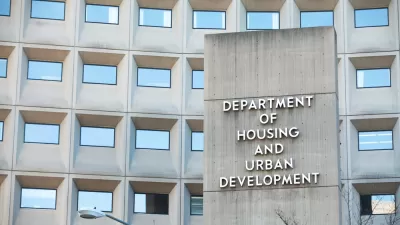Conor Dougherty, a Bay Area-based New York Times economics reporter, and Brad Plumer, a Times climate reporter, team-up to tackle the controversy surrounding SB 827 that has hit a raw nerve with groups that purport to support the bill's goals.

The idea behind the transit-rich housing bonus bill by Sen. Scott Wiener (D-San Francisco) "is to foster taller, more compact residential neighborhoods that wean people from long, gas-guzzling commutes, reducing greenhouse-gas emissions," write Dougherty and Plumer on March 16. While most all green groups support reducing greenhouse gas emissions, the primary cause of climate change, allowing high-density housing by transit stations that exceed some current residential zoning restrictions, such as height, goes too far for some.
A buzz word in the debate about SB 827, in addition to density or height, is the "preemption" of local zoning rules, though the reporters are careful to note that the bill "applies only to parcels already zoned for residential use, and city rules like historic-building protections and affordable-housing requirements would still apply [as amended March 1]. But localities would be prevented from restricting such areas to single-family homes."
[Wiener's] recent bill would pre-empt local zoning rules and allow developers to build apartment buildings up to 85 feet tall within a half-mile of train stations and a quarter-mile of high-frequency bus stops.
In Mr. Wiener’s view, local activists and homeowners too often use zoning codes to prevent apartments from being built in California’s cities, a dynamic that has worsened the state’s housing shortage.
"Michael Brune, the executive director of the Sierra Club’s national organization, said Mr. Wiener’s bill went too far in overriding residents’ say over neighborhood development," add Dougherty and Plumer.
“We are hopeful that this legislation could be designed in such a way that is successful at increasing urban infill but does it in a way that doesn’t eliminate local voices,” Mr. Brune said. “It can be challenging to get this right.”
The issue of preemption and the Sierra Club's position on SB 827 also arose in a blog by Josh Stephens (also a Planetizen contributor) in California Planning & Development Report on March 6.
Sierra Club national Communications Director Maggie Kash sent me a statement saying that the club was suspicious of anything that infringed on local control. She wrote, "Our concerns are about the mechanism of state-level preemption, which removes local voices from decision-making.” She cited proposed laws in Louisiana and Tennessee in which state law preempted local laws "in an effort to stop local affordable housing mandates.”
But what happens when a municipality acts to exclude affordable housing – is state legislation warranted even if it preempts local voices? While not legislation, that's exactly what the Mount Laurel doctrine, a series of landmark New Jersey Supreme Court rulings, did to ensure that apartments were allowed in exclusionary suburbs.
The Sierra Club statement also mentioned, as an example of why they oppose preemption, state laws that block local fracking bans. But what about the opposite, when state laws block fracking in areas that see fracking as an economic opportunity? That's exactly the scenario that played out in New York State in Southern Tier towns near Pennsylvania after Gov. Andrew Cuomo (D) banned the controversial drilling method in December 2014, a decision the Club strongly favored.
Taking a position in support of preemption, Forbes contributor, Adam Millsap, in his March 6 column, "When States Should Preempt Local Governments," doesn't mention SB 827, but makes a good case for it.
[Z]oning rules that limit the supply of housing are often demanded by residents who want to protect their home values and the character of their neighborhoods. And because only current residents, not potential residents, can vote in local elections, local politicians often fail to internalize the costs that restrictive zoning places on the broader state economy. State officials who take a broader view are more likely to overcome the exclusionary interests of local homeowners.
Times co-author, Doughtery, penned a follow-up piece for the paper's Calfornia Today newsletter on March 19: "Can Californians Drive Less?" based on a new data by Urban Footprint on how the bill would impact communities surrounding three East Bay BART stations.
Readers may be interested in listening to an hour-long discussion on the bill on KQED Forum, a call-in show for the Bay Area NPR affiliate, on March 15.
FULL STORY: A Bold, Divisive Plan to Wean Californians From Cars

Alabama: Trump Terminates Settlements for Black Communities Harmed By Raw Sewage
Trump deemed the landmark civil rights agreement “illegal DEI and environmental justice policy.”

Study: Maui’s Plan to Convert Vacation Rentals to Long-Term Housing Could Cause Nearly $1 Billion Economic Loss
The plan would reduce visitor accommodation by 25% resulting in 1,900 jobs lost.

Planetizen Federal Action Tracker
A weekly monitor of how Trump’s orders and actions are impacting planners and planning in America.

Grand Rapids Mayor Proposes Garage Conversion Plan
The mayor says allowing homeowners to convert garages to dwelling units could alleviate the city’s housing shortage.

Baltimore Ordered to Improve Sidewalk Accessibility
The city is one of many to face lawsuits for failing to comply with the Americans with Disabilities Act.

This Toronto Suburb Has More Bus Riders Than Columbus, Ohio
Brampton, Ontario used gradual improvements in service to prove that if you build it, they will ride.
Urban Design for Planners 1: Software Tools
This six-course series explores essential urban design concepts using open source software and equips planners with the tools they need to participate fully in the urban design process.
Planning for Universal Design
Learn the tools for implementing Universal Design in planning regulations.
Caltrans
Smith Gee Studio
Institute for Housing and Urban Development Studies (IHS)
City of Grandview
Harvard GSD Executive Education
Toledo-Lucas County Plan Commissions
Salt Lake City
NYU Wagner Graduate School of Public Service





























